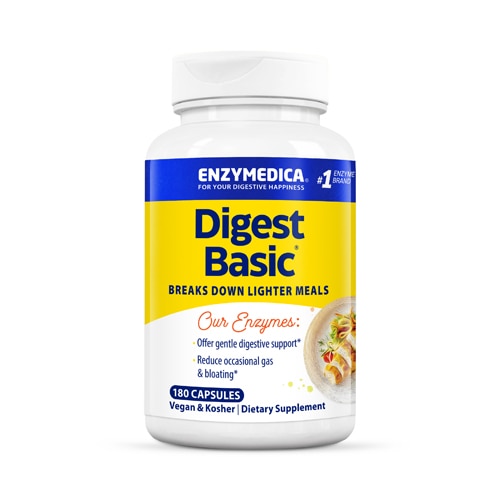Enzymes are proteins present in all living cells and needed for every chemical reaction in the body. There are two different types: metabolic and digestive enzymes. Each one performs a specific task in the body, with metabolic enzymes supporting life-sustaining functions such as growth, maintenance and repair, and digestive enzymes supporting...you guessed it, digestion.
What are digestive enzymes?
The body produces different types of digestive enzymes to break down the foods we eat, so that digestion may proceed smoothly and we may benefit from the nutrients found in these foods. Digestive enzymes are secreted along the digestive tract, starting in the mouth with salivary amylase (also called ptyalin), which helps to break down starches. From there, digestive enzymes are also produced in the stomach, pancreas and small intestine.
We may also obtain digestive enzymes through raw foods and digestive enzyme supplements. Raw foods naturally contain their own enzymes. However, once raw foods are processed or cooked their enzymes are destroyed.
Digestive enzyme supplements are sold in many health food stores and pharmacies. They are generally recognized as safe (GRAS) by the United States Food and Drug Administration. They come from different sources such as animal, plant, fungi and bacteria. Animal enzymes, also called glandular eznymes, may come from the pancreas of hog or ox. Enzyme products from animal are usually in an enteric-coated capsule. This is mainly because they work in a more alkaline environment (such as the small intestine), and they need to be coated in order to bypass the acidic environment of the stomach.
Plant enzymes such as bromelain from pineapple and papain from papaya are called proteolytic enzymes because they break down protein. Although these may have certain benefits, there are potential allergies, contraindications and medical interactions with these enzymes.
Fungal and bacterial sourced enzymes are also known as plant-based, although ‘vegetarian’ is a more appropriate word to describe these digestive enzymes. Unlike animal-sourced enzymes, vegetarian enzymes do not need to be enteric coated since they work in a broad pH range.
Why are digestive enzymes important?
Supplemental enzymes may help support digestion and assimilation of food. Why is this important? Nutrition is not just about the types of food we decide to eat, digestion of food needs to occur, then absorption and utilization of the nutrients in those foods, and finally elimination.*
According to the American Nutrition Association “70,000,000 people everyday suffer from some form of digestive issues.” The National Digestive Diseases Information Clearinghouse estimated that 20 percent of Americans suffer reflux at least once a week. Many have enzyme deficiencies due to age, diet or lifestyle, in other words, they may be lacking or not producing enough of a certain digestive enzyme. When we are not digesting foods well then we may have symptoms of occasional gas, bloating, indigestion, irregularity or other digestive challenges. On this subject, Dr. Mario Roxas states “Digestive enzyme supplementation can aid in the breakdown of fats, proteins and carbohydrates and may provide benefit in disorders in which compromised digestion may be involved.”*
What else might they help with?
Those with inadequate enzyme output often use digestive enzyme supplements. For example, many take digestive enzymes for help with specific food intolerances. The NIH has stated that 30-50 million Americans are lactose intolerant. A deficiency in the enzyme lactase, results in lactose intolerance, because lactase is the enzyme that digests lactose.
Similarly, recent studies have looked at the benefit of proteolytic enzymes such as DPP-IV or dipeptidyl peptidase-4, for use by those with gluten intolerance (not to be confused with Celiac disease). DPP-IV is an enzyme that breaks down protein such as casein from dairy and gluten found in wheat, barley and rye.
What to look for in a digestive enzyme supplement
What to look for: There are many enzyme supplements sold today. Before purchasing a digestive enzyme product, look at the source, blends and activity listed on the label. Do you have a specific food intolerance or digestive challenge? Look for digestive enzyme blends for your specific needs.
The three main groups of enzymes are proteases, lipase and carbohydrases. Protease digests protein (such as the protease DPP-IV), lipase digests fats, carbohydrases digest carbohydrates. For carbohydrates, many formulas include specific carbohydrase enzymes. For example, amylase for starches, alpha-galactosidase for complex carbohydrates, cellulase for fiber and invertase and maltase for simple sugars.
In addition, look for accurate labeling of enzyme activity. The potency of an enzyme is a way to measure the effect it has on certain substrates such as protein, fats and carbohydrates. Weight (i.e. measurement in milligrams), does not describe the true potency of an enzyme. The FCC (Food Chemical Codex) is published by the National Academy Press and is the accepted standard of the U.S. Food and Drug Administration for determining enzyme potency. A few examples of FCC activity are HUT for protease, ALU for lactase, CU for cellulase, DU for amylase, FIP for lipase, GALU for alpha-galactosidase.
*These statements have not been evaluated by the Food and Drug Administration. This product is not intended to diagnose, treat, cure or prevent any disease.
Article by Maday Labrador for Enzymedica.




